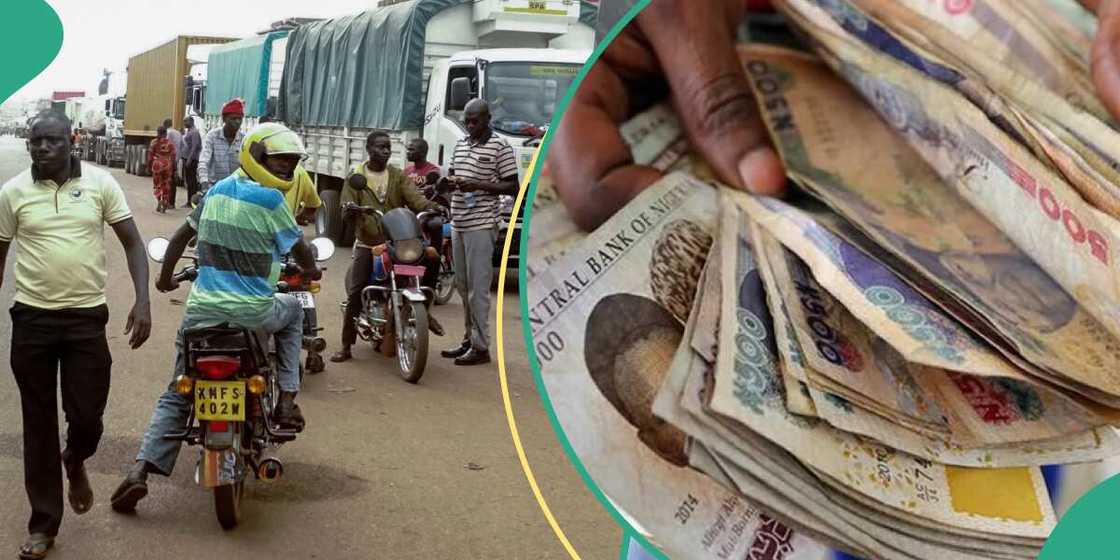Naira Faces Rejection From Traders at Borders Amid Depreciation Concerns
- Trans-border traders are beginning to shun Nigeria's local currency, the naira, as it continues to lose value
- They insist that converting naira to CFA upon return would result in a loss of earnings due to unfavourable exchange rates
- The traders are now driven towards using either the CFA franc or the local currencies of non-francophone countries
PAY ATTENTION: The 2024 Business Leaders Awards Present Entrepreneurs that Change Nigeria for the Better. Check out their Stories!
Legit.ng journalist Victor Enengedi has over a decade's experience covering Energy, MSMEs, Technology and the stock market.
In the wake of the recent depreciation of the Nigerian currency (naira), the local currency of the West African market region is facing additional challenges as trans-border traders have begun to refuse the currency.
Investigations conducted along the Seme border revealed that trans-border traders are increasingly hesitant to accept the naira. Instead, they favour either the CFA franc or the local currencies of non-francophone nations.

Source: UGC
When naira was prominent trading currency
Previously, the naira held sway as the primary medium of exchange among traders across borders due to the substantial trade volumes between Nigeria and neighbouring countries in the sub-region.
PAY ATTENTION: Share your outstanding story with our editors! Please reach us through info@corp.legit.ng!
Traders had the liberty to utilize the naira across various countries in West Africa as it enjoyed convertibility in the informal payment networks of various countries.
At that time, the naira boasted a stronger value compared to the CFA franc. However, those days have passed, as the naira is now met with rejection in these nations.
According to Vanguard research, the naira's convertibility status began to erode in February, culminating in outright rejection by March 2024.
Nigerian traders interviewed by Vanguard expressed dismay over the escalating risk of holding naira, given its consistent depreciation since last year, with the most significant decline recorded in the last few months.

Read also
Naira becomes world’s best-performing currency, continues gain after 3 days to near N1,000/$1
Naira depreciation against CFA franc
According to official reports, the naira experienced significant fluctuations against the CFA franc throughout 2023.
Starting above N1/1.5CFA in the first quarter, it plummeted to N1/0.9CFA in the second quarter and N1/0.8CFA in the third.
Following relative stability in the fourth quarter, it began in 2024 at N1/0.66067CFA in January.
However, a second wave of depreciation hit in February, causing the exchange rate to drop drastically to N1/0.38308CFA before reaching a new low of N1/0.37595CFA last week.
Naira no longer prominent currency at borders
Traders are now taking precautions against further depreciation, although a slight improvement has recently occurred.
Despite this, the naira still falls short of its former strength in the subregion, adversely impacting the cost of imported goods into Nigeria from West African economies.
Consequently, business activities have slowed on both sides of the Nigeria-Benin Republic border towns.

Read also
BDCs send message to CBN on use of foreign currency as collateral, as Naira opens strong against USD
During visits to border markets between Benin and Nigeria, it was observed that many money changers or Bureau De Change no longer prominently display the Nigerian currency as they did in the previous year.
Transporters and motorcycle taxi riders, known as Okada in Nigeria, have begun refusing payments in naira across borders.
Their rationale is that converting naira to CFA upon return would result in a loss of earnings due to unfavourable exchange rates. As a result, they consider holding CFA to be a safer option.
Speaking on the matter, Tobi Ogunsanwo, an economist, told Legit.ng that the depreciation of the naira at the time made it a better, lesser choice to consider across the region.
He said:
"Traders would likely consider trading with a currency that gives them better value for their goods.
"As we know, the naira depreciated to almost N1,900 to a dollar, proving worse than currencies in Ghana, Cote d'Ivoire and others.
"However, I believe in the last one or two weeks, the naira has greatly improved in value and we should see the naira regain its prominence again."
Naira among best-performing African currencies
Meanwhile, Legit.ng reported earlier that African markets.com, a regional research hub, has named the naira the third best-performing currency on the continent.
According to investment firm Afrinvest, the naira's value has increased by 21.4% since March, making it one of Africa's most outstanding performers at this time.
The dollar was up 301.01% in Zimbabwe, the Egyptian pound was up 52.93%, and the Nigerian naira was up 41.17% year-to-date.
PAY ATTENTION: Stay Informed and follow us on Google News!
Source: Legit.ng




